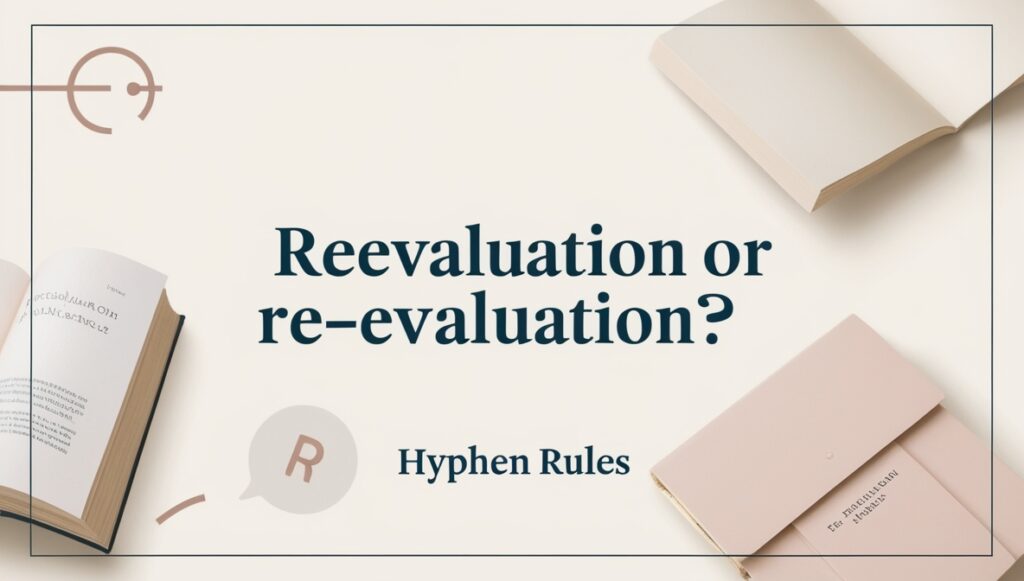In both professional and everyday writing, clarity and precision are paramount. Every detail, from word choice to punctuation, can impact the reader’s understanding. One area where many writers falter is in the use of hyphenated words, particularly when it comes to the word “reevaluation.”
This article aims to clarify whether to use “reevaluation” or “re-evaluation,” and why this distinction matters. We will delve into the rules that govern hyphenation and explore common misconceptions. By the end, you’ll have a comprehensive understanding of this nuanced topic, equipping you to communicate more effectively.
Reevaluation or Re-evaluation: What is correct?
The correct spelling is “reevaluation,” without a hyphen. This term implies the act of evaluating something again or anew. Using it without the hyphen is the preferred form in most modern contexts, as it adheres to contemporary style guidelines that favor simplicity in compound words.
Key Takeaways
- The correct form is “reevaluation,” not “re-evaluation.”
- The term means to evaluate something again or in a different manner.
- Most modern style guides prefer the unhyphenated form, reflecting language evolution.
Reasons for Confusion
The confusion surrounding “reevaluation” often arises from several factors:
- Similarities to Other Words/Phrases: English has numerous terms that utilize hyphens. Words like “reexamine” and “reorganize” follow similar rules, making it easy to mistakenly apply hyphenation to “reevaluation.”
- Pronunciation and Spelling Variations: Certain dialects may emphasize parts of the word differently, leading to a preference for hyphenation in some regions.
- Regional Influences: Different English-speaking countries may follow varying conventions. While American English leans toward streamlined, unhyphenated forms, British English may retain more traditional hyphenation in some contexts.
Detailed Explanation
Understanding when to hyphenate a term involves a deep dive into English’s evolving rules around compound words. Let’s break down “reevaluation” in detail.
Meaning and Contexts
The primary meaning of “reevaluation” is to assess something again. This can apply in various scenarios:
- Academic: An instructor might undertake a reevaluation of grades after receiving student feedback.
- Business: A company may conduct a reevaluation of its policies to improve employee satisfaction.
- Personal Growth: Individuals can have a reevaluation of life choices during significant transitions.
The absence of the hyphen in “reevaluation” represents a trend towards simplicity, which is encouraged in modern English language usage. By eliminating unnecessary punctuation, we foster clearer and more streamlined communication.
Common Errors

Writers often mistakenly use “re-evaluation,” typically for the following reasons:
- Habitual Patterns: Habitually using hyphens in similar compound words can lead to incorrect applications.
- Outdated Resources: Some older style guides might recommend hyphenation, and relying on these can perpetuate errors.
Why Avoid Incorrect Variations?
Using the hyphenated form can detract from the professionalism and clarity of your writing. Keeping your use of language current, especially in formal communications, signals attention to detail and knowledge of contemporary writing practices.
Synonyms or Alternatives
While “reevaluation” is a powerful term, having alternatives can enrich your vocabulary:
- Review: This term signifies examining something again, often implying a less formal context.
- Reassessment: This synonym indicates an evaluation with potentially different conclusions drawn.
- Revision: Commonly used in academic contexts, it denotes making changes based on further evaluation.
Depending on context, using one of these alternatives might provide more nuance to your writing.
Examples in Sentences
Here are sentences showcasing the term “reevaluation” in various contexts to encourage a clearer understanding of its application:
- Academic Context: “After the student’s appeal, the professor decided on a reevaluation of the final exam scores.”
- Corporate Setting: “Following the feedback from last year’s employee survey, the HR department initiated a reevaluation of the current benefits package.”
- Personal Decision: “The sudden changes in his career led to a deep reevaluation of his life’s goals and aspirations.”
- Research and Development (R&D): “The team conducted a reevaluation of their project after the initial prototype failed to meet performance standards.”
Origins and History
The term “reevaluation” comes from the prefix “re-“ (meaning again) combined with “evaluation,” which can be traced back to the Latin word “valutare” meaning to value or assess. Over time, the integration of prefixes such as “re-“ has streamlined the language, leading to the modern preference for unhyphenated compound words.
Historically, compounds were often hyphenated to clarify meaning or aid pronunciation. However, as English evolves, the tendency is toward simplification, which is reflected in the modern, unhyphenated term “reevaluation.”
Conclusion
In summary, the correct usage of the term is “reevaluation,” steering away from the hyphenated form “re-evaluation.” This distinction is crucial for conveying clear and polished writing. Understanding the nuances of hyphenation not only enhances your vocabulary but also solidifies your grasp of English; it is instrumental in professional communication, academic pursuits, and everyday interactions.
Always remember:
- The unhyphenated “reevaluation” is the preferred contemporary spelling.
- Hyphenation can be confusing, often reinforced by habit or outdated resources.
- Familiarizing yourself with standard usages can significantly enhance the clarity and professionalism of your writing.
By honing your skills in proper word usage, you can express ideas more effectively and contribute to more meaningful communication.

Emily Hudson, the creative mind behind “English Summa,” is a passionate English language educator with a Bachelor’s Degree in English and a Teaching Certification. Dedicated to making the intricacies of English accessible to learners, Emily brings a blend of expertise and enthusiasm to her readers. Follow English Summa for insightful language tips, literary explorations, and a shared love for the beauty of English.














